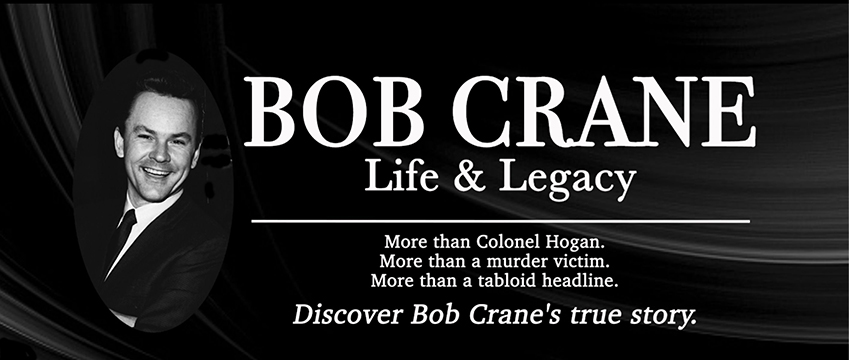 |
Bob Crane KNX Portrait / Gabi Rona,
Photographer. Original autographed photo from the personal collection of Carol Ford. |
On September 3, 1956, Bob Crane launched his radio show over KNX-CBS Radio in Los Angeles. Within a very short period of time, he took the West Coast by storm, quickly earning himself one of Southern California's top radio seats, rivaled only by Dick Whittinghill at KMPC. Over the course of the next nine years, Crane and Whittinghill would combat each other over the airwaves, and while Whittinghill often edged Crane out in the market share by mere fragments, it was Crane who became immortalized in radio history as "King of the LA Airwaves."
By 1957, Bob Crane had become a household name and an advertiser's dream (or nightmare!). Gimicks, drums, 1,000 voices, and more than 3,000 individuals, most of them celebrities, had become staples on Crane's show in the early morning Pacific Coast hours. Listeners came to expect one thing from their frenetic morning man: the unexpected.
 |
| Early KNX ad promoting 'The Bob Crane Show.' September 1956 |
And take over the West Coast, Bob did. Friend and Variety Magazine Editor Harvey Geller remembered: "The number-one guy was Dick Whittinghill at KMPC, who had the biggest audience. But Crane had the people inside the industry - the movie industry and the record industry - so he had, I think, a better audience."
Crane also had the sponsors. Through his innovative routine of integrating various gimmicks, voices, drumming, and gags into the commercials, companies that had purchased 15 or 30-second ad spots usually ended up with a minute or more of airtime as Crane knocked around their product or service.
Yet, Bob was careful, and he was conscious not to go too far with his gags. In a 1961 presentation to LA College, Bob urged the next generation of radio personalities: "If you’re ever in doubt, if you think something is a little bit off-color, you’re debating it. If you have to debate it, then don’t do it. If you reach that point where you’re thinking, should I say that? Then don’t say it. 'Cuz you’re gonna offend somebody. If you gotta think about it, then they’re gonna think about it. They’re gonna hear it at home and say, 'Ehhhh?'”
Yet, Bob was careful, and he was conscious not to go too far with his gags. In a 1961 presentation to LA College, Bob urged the next generation of radio personalities: "If you’re ever in doubt, if you think something is a little bit off-color, you’re debating it. If you have to debate it, then don’t do it. If you reach that point where you’re thinking, should I say that? Then don’t say it. 'Cuz you’re gonna offend somebody. If you gotta think about it, then they’re gonna think about it. They’re gonna hear it at home and say, 'Ehhhh?'”
 |
| KNX-CBS Radio / Columbia Square Los Angeles, CA / circa 1960 |
In 1963, McElroy was let go from KNX as part of a reduction in staff. However, he soon began receiving phone calls from other stations looking to hire him. Leo later discovered that Bob had contacted those stations, stating, "You want the guy who can beat me in the ratings? Leo is the guy!" When Leo tried to thank Bob, Bob wouldn't hear of it. "In my dictionary," Leo states, "when you look up the word 'friend,' it's still got Bob Crane's picture on it."
 |
| Bob Crane KNX Postcard / circa 1960 |
Further, those who knew Bob Crane well - those who worked with him and called him friend - will attest that his memory has been treated unfairly since his death. "Bob was kind," Leo remembers. "He was kind to those he worked with. He was kind to those he knew. He was a guy who quite obviously cared to make their lives a little easier, a little nicer without intruding himself on them. I really honor him for that. This was a friend who wanted nothing in return, and had he the opportunity to do something nice, he would do it. He did it for me, he did it for others, and he did it because he was a kind man."
~~~~~~~~~~~~~~~~~~~~~~~~~~~~~~~~~~~~~~~~~~~~~~~~~~~~~~~~~~~~~~
Of the many celebrities interviewed by Bob Crane, Richard Chamberlain was a favorite guest. Here, in this early 1960s radio clip, Chamberlain helps Bob try to give away a $500 stereo system to a contest winner. Their efforts go awry when the winner has a rather difficult time comprehending the situation!
Bob Crane Show / KNX-CBS Radio
1964
* * * * * * * * * * * * * * * * * * * * * * * * * * * * * * * * * * * * * * * * * * * * * * * * * * * * * * * *
Leo McElroy's book, ...But You Can't Report That!, was published on May 10, 2011. Leo currently works as a consultant in Los Angeles and stays active with community theatre, most recently directing the successful production of Dinners with Augie at the Geery Theatre in Sacramento, CA.
Harvey Geller passed away on March 12, 2009, following a brief illness. He was 86. In 2002, he voiced his opinion about Auto Focus in a Letter to the Editor to the LA Times, claiming the way the film presented Bob Crane was severely "out of focus." To read the letter, click here.
